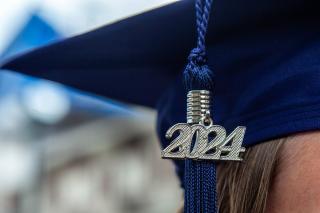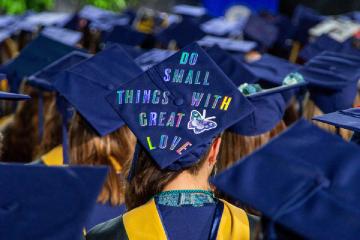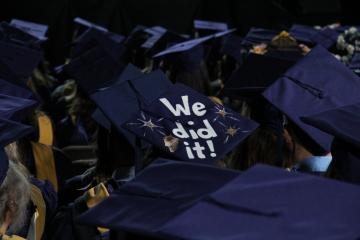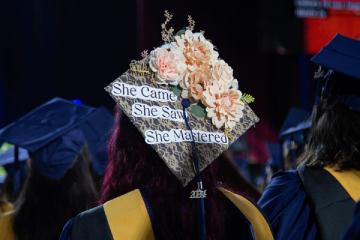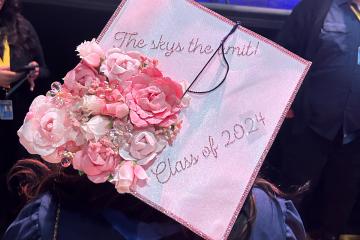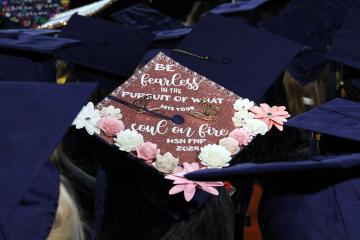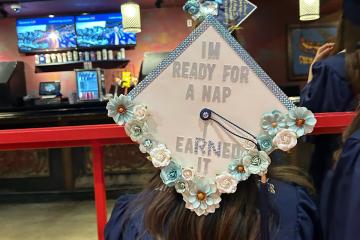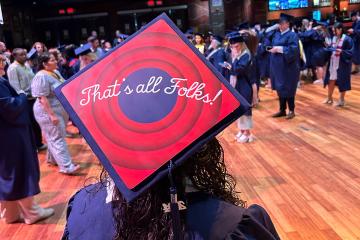On Friday, May 17, 2024, Simmons University celebrated the 119th Commencement Ceremonies at the MGM Music Hall at Fenway. These events honored the many accomplishments of the Class of 2024. Simmons awarded over 500 baccalaureate degrees and nearly 2,100 graduate degrees during these ceremonies.
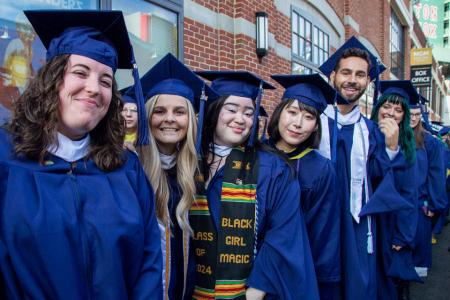
Graduating students smiled and waved to family and friends as they processed into the MGM Music Hall, many with mortar boards decorated with flowers, ribbons, artwork, photographs, and messages: “Stand Tall!" They were followed by Simmons faculty in robes of black, gray, blue, and maroon. Professor Bob White received a special cheer from the crowd when he appeared on the large screen, and the crowd applauded for President Lynn Perry Wooten upon her arrival, followed by Deans, Directors, and Commencement speakers.
Regina Pisa, Chair of the Simmons University Board of Trustees, initiated the ceremony and recognized Simmons students' achievements. Pisa invited the Class of 2024 to stand and applaud their family and friends, and faculty and staff of Simmons, in gratitude for their support. “We, the Trustees of Simmons University, are proud of your accomplishments,” said Pisa. “We are confident you will carry the name of Simmons into your professions and communities with distinction, dignity, and pride.”
Pisa introduced the 9th Simmons University President Lynn Wooten, who emphasizes her belief that “when Simmons leads, the world works better…This is in large part due to YOU – your determination, and yes, your courage – to pursue a career and a life’s path that has purpose and meaning. Those characteristics, combined with your Simmons degree, will serve you well as you continue your studies, or begin or continue your careers. I am confident you will use your talents and passions to create a better future for all of us. Because that is part of the magic of Simmons."
Professor of Practice and Master of Social Work Program Director Gary Bailey delivered a soulful Invocation. Here he emphasized that life’s deepest meanings are not about achieving finite goals. Instead, one finds fulfillment “in those extraordinary moments when we encounter, respond to, and work in communion with others.” Following the Invocation, Simmons' Vice President of Student Engagement and Dean of Students, Rae Ann Butera introduced the Class of 2024 Graduate student speaker, Jessica Diane Cameron, candidate for Master of Science in Library and Information Science.
Cameron juggled parenthood and a full-time job while excelling in their academic pursuits at Simmons. “Regardless of background, we each came here looking for change, looking for more, looking for ourselves,” said Cameron. “And Simmons welcomed us as we were; the messy, the anxious, the insomniacs, the perfectionists. The chronic academics, the underemployed, the social media addicts. Through all our quirks and our flaws, Simmons saw something worthy in each of us, even if we couldn't yet see it ourselves.” Cameron encouraged their peers to acknowledge that “who you have become is more than enough.”
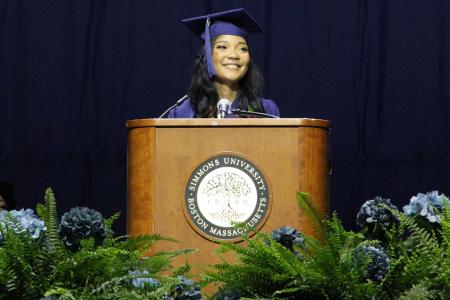
President Wooten introduced undergraduate student speaker Azeemah Solomon, candidate for Bachelor of Science in Biology. During her time at Simmons, Solomon was a Faculty-Student Collaborative Fellow, a student coordinator in the Jennifer Eckert Center for Leadership and Engagement, and a Lead BRIDGE Mentor for incoming first-year BIPOC students. As the first person in her family to graduate from college, Solomon reflected on the challenges she and her peers have faced over the past four years. “...even in the midst of a global pandemic, we chose to look at the glass as half full, rather than half empty. This mentality has allowed us to live life fearlessly and has ignited a fire in us that is impossible to extinguish.”
Provost Stephanie Cosner awarded the honorary Doctor of Public Service to Meredith Woo, Professor of Practice at Arizona State University and a renowned academic author who, as the former President of Sweet Briar College, confirmed her commitment to women’s education. In her Commencement Address, Woo reflected on her arrival to the United States as an undergraduate student, after which she “resolved to begin a new life in the United States, a complex and contradictory country: spectacularly beautiful, powerful, open, generous, and innovative — and sometimes mean and heart-breaking.”
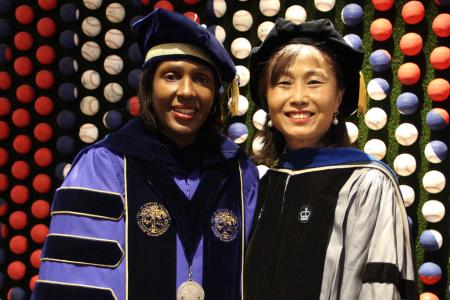
Woo reflected on the complexities of modern society, noting, “There will be a greater diversity of voices and perspectives in your world, both within the United States and abroad. Your great challenge is taking stock of this and building and sharing a common world with others with different perspectives…Only when we try to understand perspectives that are different, alien, and from the left field do we move closer to seeing reality as a whole and develop a shared ‘common sense.’”
During the afternoon commencement ceremony, Doctor of Social Work candidate Robert Nesbitt Jr., delivered the student address. A licensed clinical social worker, Nesbitt is committed to supporting individuals with intellectual disabilities and mental health challenges.
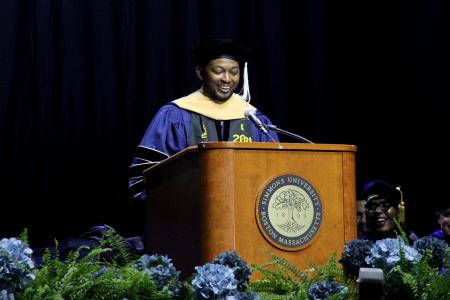
For his commencement address, Nesbitt composed a poem that he dedicated to the Class of 2024: “There are so many layers to our identities, our intersectionality, / and the incomparable colors of our personalities. / Together we stand intersected and woven. / The same fabric of academia, / We take action, move freely, and remain unfrozen. . . . As we are navigated by the principles of equity, / The time is now to be a stronger ally, to be even more of a fierce advocate. / Advocating for peace, social justice, we are the brand, the gold standard, strategic and never haphazard.”
Provost Stephanie Cosner conferred an Honorary Doctorate in Public Service to commencement guest speaker Claudia Goldin, the Henry Lee Professor of Economics at Harvard University. As a Nobel Memorial Prize-winning economic historian and labor economist, Goldin has researched the gender pay gap and women’s progress in the workforce and education.
In her Commencement Address, Goldin began by tracing the meteoric rise of college-educated women and women with advanced degrees from 1900 to the present. However, she pointed out that female professionals’ wages and promotions are still less than that of their male counterparts. This disparity is compounded with dual-career (heterosexual) couples who have children. In these relationships, one parent (typically the mother) must serve as the “on call at home” parent who takes a job with more flexibility but lower wages than her partner. “Gender equality is thrown under the bus along with couple equity,” said Goldin.
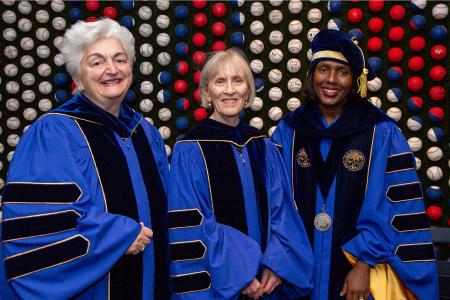
For Goldin, the pandemic ultimately revolutionized workplace culture for women. “As offices and schools shut down in March of 2020, and as ‘going to work’ was radically redefined, flexibility jumped to the forefront of workplace discussions,” explained Goldin. Since previously higher paying jobs have been recalibrated as permanently hybrid or remote, “the working couple with children can now have a more equitable household without giving up as much income.” While advancing a career and raising a family will still present challenges before women, Goldin is optimistic that the “new normal” will help pave the path toward a more equitable future. “We will have reduced the price of flexibility, increased the productivity of flexible jobs, enhanced couple equity and reduced gender inequality.”

